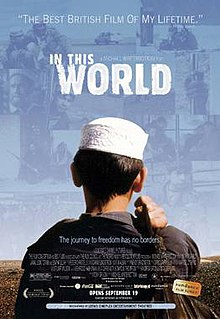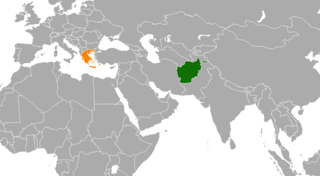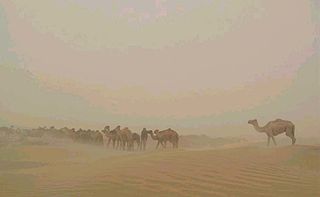The following lists events that happened during 2001 in Afghanistan.

This article on the History of Afghanistan since 1992 covers the time period from the fall of the Najibullah government in 1992 to the ongoing international military presence in Afghanistan.

In This World is a 2002 British docudrama directed by Michael Winterbottom. The film follows two young Afghan refugees, Jamal Udin Torabi and Enayatullah, as they leave a refugee camp in Pakistan for a better life in London. Since their journey is illegal, it is fraught with danger, and they must use back-channels, bribes, and smugglers to achieve their goal.
Afghan refugees are nationals of Afghanistan who left their country as a result of major wars or persecution. The 1979 Soviet invasion of Afghanistan marks the first wave of internal displacement and refugee flow from Afghanistan to neighboring Pakistan and Iran that began providing shelter to Afghan refugees. When the Soviet war ended in 1989, these refugees started to return to their homeland. In April 1992, a major civil war began after the mujahideen took over control of Kabul and the other major cities. Afghans again fled to neighboring countries.
The following lists events that happened during 2000 in Afghanistan.

The 2001 uprising in Herat was a coordinated insurrection and uprising in the Afghan city of Herat as part of the United States war in Afghanistan. The city was captured on November 12 by Northern Alliance forces as well as Special Forces of the United States, the United Kingdom and the Islamic Republic of Iran.

This article covers the Afghan history between the Taliban's conquest of Kabul and their establishing of the Islamic Emirate of Afghanistan on 27 September 1996, and the U.S. and U.K. invasion of Afghanistan on 7 October 2001: a period that was part of the Afghan civil war that had started in 1989, and also part of the war in Afghanistan that had started in 1978.

Afghanistan–Iran relations were established in 1935 during King Zahir Shah's reign and the Reza Shah Pahlavi of Iran (Persia). They have been negatively affected by the 1979 Iranian Revolution and issues related to the 1978–present Afghan conflicts, as well as Iran's water dispute, the growing influence of the United States in Afghanistan.
The following lists events that happened during 1998 in Afghanistan.

There is a large population of Iraqis in Iran, including Iranian citizens of Iraqi origin or descent, as well as Iraqi citizen expatriates. According to the 2001 Iran census, there were roughly 203,000 Iraqis living in Iran; a UNHCR report counts 204,000 Iraqis living in Iran. The actual figure is likely to be much higher than this, perhaps exceeding 500,000, as many Iraqis gained Iranian citizenship while in Iran. In recent years, many have returned to Iraq following the fall of the Saddam Hussein regime.
Barefoot to Herat is a 2002 Iranian film by Majid Majidi. It is a documentary about the plight of Afghan refugees just after the 2001 military offensive against the Taliban.

Afghanistan–Greece relations refers to the diplomatic relations between Afghanistan and Greece.
Afghans in Pakistan primarily constitute refugees who have fled wars in Afghanistan, but there are small numbers of Afghan asylum seekers, migrant workers, merchants, businesspeople, exchange students and diplomats. Most were born and raised in Pakistan and are under age 30, but are still considered citizens of Afghanistan. They are under the protection of the United Nations High Commissioner for Refugees (UNHCR), and have been given legal status in Pakistan until the end of 2017.
The population of Afghans in Tajikistan consists largely of refugees from the various wars which have plagued Afghanistan. They form the vast majority of all refugees in Tajikistan; the other refugees in the country include a few Uyghurs and Iraqis.
Niatak is an Afghan refugee camp in Iran's southeastern Sistan and Baluchestan Province, near the Iranian city of Zahedan and close to the Afghan border. In 2001 the camp was described as holding 5,000 refugees, while a 1998 report cites 7,000.
Afghan Refugee Camp is a village and refugee camp in Taraznahid Rural District, in the Central District of Saveh County, Markazi Province, Iran. At the 2006 census, its population was 3,727, in 649 families.
Afghan Refugee Camp is a village and refugee camp in Mashiz Rural District, in the Central District of Bardsir County, Kerman Province, Iran. At the 2006 census, its population was 7,679, in 1,545 families.

Makaki is a village in Dust Mohammad Rural District, in the Central District of Hirmand County, Sistan and Baluchestan Province, Iran. At the 2006 census, its population was 74, in 19 families.









